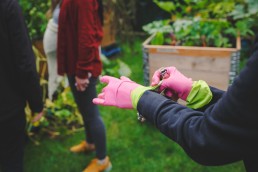
The urbanists are active in Dortmund’s Westgarten, among other places.
More community gardens in the Ruhr area – how does that work? Jonas Runte and Nils Rehkop recently explored this question in a digital workshop organised by lala.ruhr. As members of the Dortmund Urbanists, they can report from years of practical experience in the implementation of community gardens.
Public, communal and voluntary – these are the core elements of the definition of urban gardens. More than 100 urban gardens and about 1600 allotment gardens exist in NRW. In the city in the form of community gardens, school gardens, guerrilla gardening and “edible city” areas, close to the city as rented fields or areas for solidarity agriculture. The facilities serve a variety of aspects: in addition to environmental protection and the strengthening of biodiversity, social aspects in particular are in the foreground. Gardening together promotes, among other things, encounters and exchange, identification with the neighbourhood, and saves money through the aspect of self-sufficiency.
However, it is not enough to “put a garden in front of people’s doors”. According to the urbanists’ experience, it is much more important to build up a motivated group that is willing to get its hands dirty. Not only with soil, but also with the sometimes exhausting filling out of papers. Nevertheless: gardening together in the Ruhr area is possible and it is fun, so the conclusion. If you are interested in the various examples from Dortmund and the surrounding area as well as information on funding opportunities, you can find the presentation on the workshop here: Urbane-Gärten-im-Ruhrgebiet-die-Urbanisten
Text: Jonas Runte/Sonja Broy
Foto: die Urbanisten e.V.